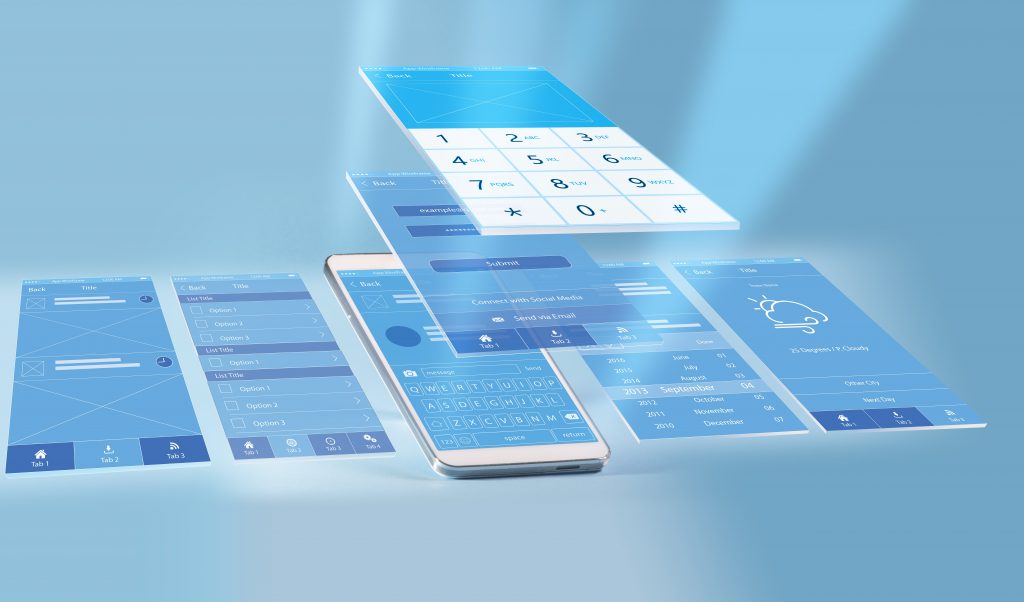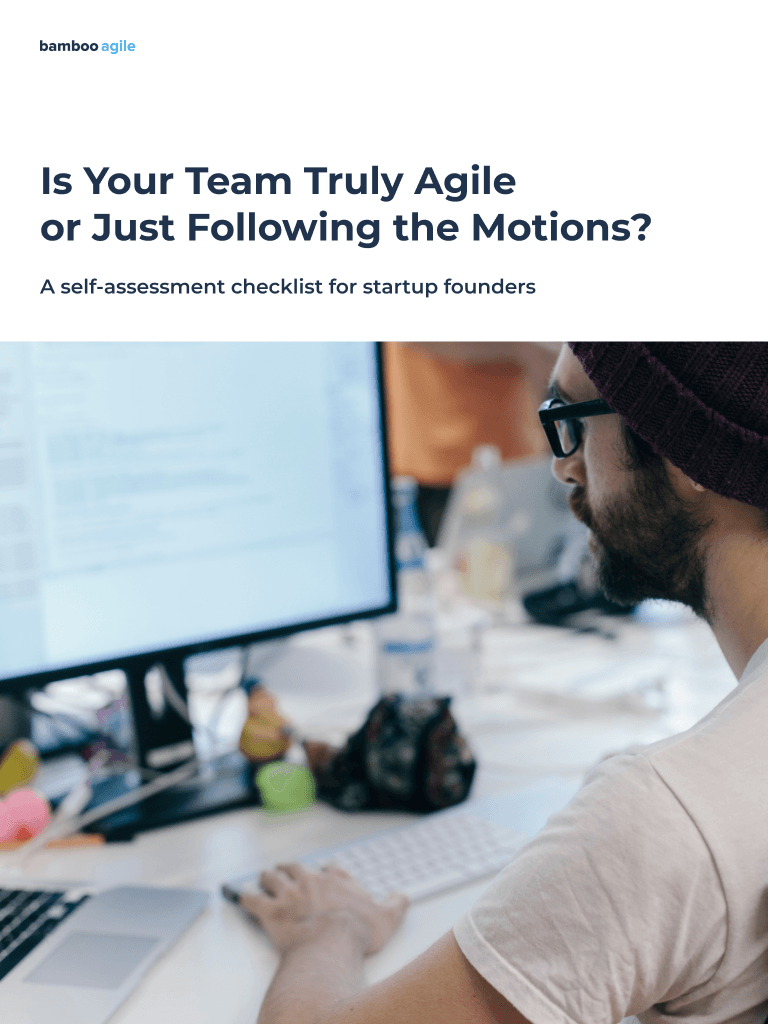Introduction
Enterprise mobile app development helps encourage communication between employees of one company and leads to a more elaborate interaction between all of its structural divisions. By having constant access to a tablet or smartphone, a person can work even outside the office, which is especially convenient in case of various unforeseen situations that require a prompt solution. Also, such a tool can increase the efficiency of communication between superiors and subordinates.
By using an enterprise mobile app, company employees have an opportunity not only to demonstrate the capabilities and focus of the company to clients, increasing customer confidence, but also to keep a connection with all the necessary aspects of client services or other important features.
What Is An Enterprise Mobile App?
In short, an enterprise mobile app is an app that can improve workflow and help organisations simplify task performance. Such applications help engage more people effectively. An enterprise mobile app may contain a variety of tutorials, databases, and more. Such applications can duplicate the core programs and resources that employees use on their computers, or they can be unique and complementary to work tools.
The State Of The Enterprise Mobile Apps Development Market
The enterprise application development market is rapidly evolving, driven by the increasing use of mobile devices in the workplace and the growing demand for mobile apps that can improve business processes and productivity. According to a report by Grand View Research, the global enterprise mobile application market size was valued at USD 206.85 billion in 2022 and is expected to grow at a compound annual growth rate (CAGR) of 13.8% from 2023 to 2030.
One of the major trends in enterprise application development is the adoption of low-code or no-code platforms, which allow organisations to develop mobile apps without the need for extensive coding knowledge or resources. This trend is attributed to the ever-growing need for faster app development and deployment, as well as the shortage of skilled developers. According to MarketsandMarkets, the low-code development platform market is expected to reach USD 45.5 billion by 2025.
Levels Of Enterprise Mobile Apps
Enterprise mobile apps can be divided according to the reach of users they have. The basic option is an app for employees that has simple functionality and is intended only for internal processes and needs. For example, these applications help managers control the workflow and have access to specific information for a certain task.
The more complex option is an app for employees within one department. This application allows employees to contact within a specific department, for example, a marketing team. In addition to the optimisation of the workflow within the department, such an application can also be useful for customers. They can keep in touch with a specialist and provide feedback with minimal delays.
The most all-encompassing option is the company-level application. Such applications connect all the employees and departments of a company into a single network. Applications of that kind allow employees of all levels to be in touch and have access to various internal information, depending on the employee’s access level.
Types Of Enterprise Mobile Apps
Management Software
Management software is one of the most significant areas of mobile app development because it encompasses almost every aspect of the business. Here are several examples:
- ERP (Enterprise Resource Planning) software is used to centralise all parts of the company;
- Human resource management apps are used to automate manual activities, store employee data, and generate data-driven reports.
- Business management apps are used to automate, support, and optimise procedures.
Team Collaboration Software
Slack and Asana are two examples of popular team collaboration and communication tools.
Other subcategories of collaboration software include:
- CRM (Customer Relationship Management) apps analyse, manage, and communicate with customers;
- CMS apps are used to develop, edit, and publish content for the enterprise’s social media and websites;
- CRM and CMS platforms are widely employed in a wide range of industries, from small firms to major corporations.
Marketing Automation Software
Marketing automation software assists businesses in managing sales funnels, launching advertising campaigns, investigating prospects, and producing extensive data for analysis. Such applications are generally used to speed up repetitive tasks and keep everything in one location.
Billing Systems
Billing systems are a common requirement in the development of enterprise mobile apps. They are used to automate invoicing, payments, and whatever else the business may require. Third-party payment gateways and in-house CRM or ERP platforms are frequently connected to such software. For example, Bamboo Agile was engaged in enterprise mobile apps development for clients such as E-Wallet for MobileTeleSystems and Velcom Recommends for the mobile network operator A1.
Messaging Software
Messaging software is one of the most widely used communication tools. To facilitate team communication, businesses frequently combine audio and video conferencing, calendars, file sharing, and other tools. This is done to produce a product that fits all business requirements while also complying with security rules.
Customer Support Software
Customer support software includes call and message routing, customer ratings, portals for self-service, customer management, and hundreds of other capabilities. It is necessary to assist your staff in providing top-tier service that keeps all clients delighted.
Benefits Of Enterprise Mobile App Development

Aside from enhancing income and productivity, enterprise application development services can provide other advantages to your business. The following are the most frequently mentioned benefits.
Improved Accounting
You can develop an accounting-specific enterprise mobile app. This implies that your accountants will be able to set payment deadlines, send tax notifications, monitor transactions, and execute any daily activity from the convenience of their smartphones. Work becomes significantly more comfortable as a result of this.
Structured Data
Enterprise mobile application development is typically associated with the creation of large-scale applications with vast capabilities. So software engineers need to combine multiple main modules to ensure that all departments may freely collaborate while storing all data in one location. This keeps everything organised and increases efficiency.
Control Of The Supply Chain
Businesses can utilise mobile apps to monitor and regulate supply chains, manage couriers, and analyse warehouses. The programme enables responsible individuals to check the relevant information from any location and at any time, making the procedure quick and simple.
Improved Onboarding
Companies frequently create workplace mobile apps with onboarding elements like introductions, tone of voice, explanations of work and certifications, relevant contacts, and other information. This also benefits HR because it streamlines staff management.
Business Strategy
Remove all the paperwork and move everything to the digital realm. Everyone can access relevant documents from any device, eliminating the need to print physical sheets. Furthermore, as marketing campaigns, payments, and many other activities become automated, the chance of human error is reduced.
Reasons For Undertaking Enterprise Mobile App Development
It Drives Business Processes And Productivity
Enterprise mobility is a prerequisite for competitiveness for any business, and future productivity growth will largely depend on this factor. Mobility translates into increased throughput as measured by sales, reduced inventory, and operating costs – three benchmarks voiced by Eliyahu Goldratt in The Goal. This efficiency is achieved by combining mobile applications with data analysis. And when mobile strategists link business-relevant analytics to each mobile app, the app’s value can be maximised. Analytics is a key milestone in enterprise mobile app development and continues to deliver value throughout the life of the associated application.
It Empower Employees Working Outside The Offices.
Many companies have field workers – delivery services, truckers, airport mechanics who have to ensure the safety of aircraft flights. The fact that these workers do not work in offices is nothing new. What is new, however, is that businesses adopting smart devices, especially tablets, give workers real-time insight into their involvement in the processes. And also, the ability to transfer first-hand feedback to the enterprise. As a result, this data is immediately analysed and transmitted in the form of business intelligence back to the devices of these workers.
It Has Never Been So Easy.
The emergence of new standards and offers in the IT industry is changing the market situation. Consumers have become accustomed to buying apps, and companies are actively trying to create apps that people would want to use. To a large extent, the value of an application is determined by its applicability. Despite the fact that now enterprise mobile app development is becoming more popular than ever before, there are still a very limited number of enterprise mobile developers in the world, considering the growth of popularity of iOS and Android development.
This information may rightfully be thought-provoking, but it doesn’t diminish the enthusiasm for mobile apps. The solution to the puzzle of how to simplify enterprise mobile app development during a global talent shortage lies in new application development models.
Common Features
If you intend to create corporate mobile apps, you should first become familiar with the characteristics required for this type of software. There are numerous differences that set it apart from other Play Market applications.
- Security. Most businesses and enterprises prioritise security since even the tiniest data leak can cause a slew of problems. As a result, enterprise-grade software must have features such as two-factor authentication, data encryption, role management, and others.
- User Roles. A strong permission system is required to control each user’s access. Permission management in a business application can be more complex. Setting access individually may be the best option in some circumstances.
- Third-Party Integrations. While mobile application development services can be used to produce any functionality, developing every single feature as a custom solution is time-consuming and expensive. So the corporate app should be able to integrate with the most common technologies in your industry. This increases work efficiency and makes the solution easier to adopt.
- Data Sharing. Mobile software can offer a wide range of data-sharing capabilities, from simple text documents to multi-gigabyte files. Many applications have very strict file size limits, meaning your enterprise solution should either improve or remove the limitations to allow for smooth data sharing and a stable working environment.
- Cloud Storage. Cloud storage is frequently included in enterprise-grade mobile app development. The whole point of this is that software provides quick and smooth access to data, improving your team’s work experience. This kind of function will be appreciated by all your team members.
- Messaging. Having an integrated messaging system in your workplace solution is advantageous since putting everything in one place makes work much more efficient. All team members are displayed in a single app, you can instantly share any file from the cloud storage, and all work-related data is readily accessible.
- Push Notifications. Modern businesses frequently use remote workers and do not need employees to complete a 9 to 6 shift with no breaks. This means that employees may be away from their workplace at times and not have access to the PC version of the software platform. A mobile solution will notify them anytime something significant occurs.
- Offline Mode. Nobody is safe from power and internet outages. Allowing offline access to all vital data allows people to continue working in any situation. This is a critical step for job efficiency and comfort.

Things To Consider In An Enterprise Mobile App Development
What Employees Need From An App
Employees often use gadgets at work. They are accustomed to the functionality of certain applications to perform specific tasks. For an employee to switch applications comfortably, it is necessary to offer a worthy alternative to what is available. To do this, you need to find out which applications employees use most often and what functionality is mostly in demand.
Perspectives Of App Development
The world of mobile devices is changing at a tremendous speed, which must be taken into account when developing novel systems. No one wants an application that will become irrelevant in a short amount of time, so when developing an application, it is necessary to choose a worthy enterprise mobile app development company.
Integration With Useful Software
Very often employees use programs, the functionality of which is either too difficult or too expensive to replicate. In this case, it is worth thinking about integrating such programs into the developed application.
Security Issues
In most cases, corporate mobile applications will be installed on personal smartphones or tablets. In this case, you need to make the most of the mobile app security. For example, it is necessary to set not only a simple password to enter the application, but also go through a two-factor authentication. It may also be necessary to regularly change the user’s password so that an unauthorised person cannot gain access to their information.
Development Strategy
Sometimes working with development contractors isn’t convenient for large-scale companies due to some limitations in processes and budgeting. Therefore, it’s better to choose an enterprise mobile app development company which has experience with workflow methodologies perfect for such structures – Waterfall or the SAFe framework (Agile) for more flexible budgeting.
KPIs
It is critical to establish which outcomes you would deem successful. To do so, you must set specific KPIs, or key performance indicators. Each KPI must be measurable so that both qualitative and quantitative data can be obtained.
It is hard to develop software for firms and huge corporations without taking these factors into account. When you begin planning, you will notice that there are many little factors to consider. As a result, you should brainstorm the topic with the key decision makers on the project.
Stages Of Enterprise Mobile App development
1. Analytics And specifications
Every application starts with an idea. The client plans what issues the future service should solve, and initiates market research, such as finding a suitable market segment, carrying out an analysis of existing solutions, studying competitors and customer behaviour patterns, and other information that might be helpful for enterprise mobile developers. The customer’s life cycle is thought out at each stage of the analysis, so this helps understand how people will use the new application, and to make it as user-friendly, clear, and functional as possible.
At this stage, it’s necessary to make a detailed description of the functionality and design of the future application. Business analysts define user roles, describe user stories, draw up a customer journey map, and form technical requirements for the service. It means that several things get set in stone: what the application will be, what it should be able to do, and how it will work.
Thanks to the specifications, the team of enterprise mobile developers and designers clearly understands what kind of service the client wants to receive, and gradually implements the initial idea.
What you have as a result:
- a list of functions that should be implemented in the application;
- requirements for the interface, user roles, security, performance, and other non-functional requirements;
- description of how all these enterprise requirements in mobile apps should be implemented;
- an outlay of the project.
Read more about mobile application architecture.
2. Design
Here the work is divided into two areas: UX design and UI design.
UX/UI designers are working in an inseparable tandem to define how the application will look and what its user interface will be.
UX design aims to improve user experience in its literal meaning, modifying the functionality and intelligibility of the future application. In this case, a designer thinks through the interactions between design elements to see how the app performs in the most common user scenarios. The logic of the application is checked and adjusted to make the user experience as positive as possible.
UI design is aimed at reaching the attractiveness and peculiarity of elements by selecting fonts, choosing a colour scheme, rendering interface elements: buttons, icons, sliders, push notifications. Depending on the size of the project, design preparation can take from one week to several months.
The result of UX/UI designers work is a wireframe, mockup, or prototype – an interactive model of the future application. It is better to make an interactive prototype, for example, in Figma. By clicking on the link, you can use the application as if it were ready and installed on your smartphone: navigate through sections, click on buttons, and perform various actions.

3. Development
Programming is one of the main stages of any development cycle. Writing code for an application is divided into frontend and backend development. At the frontend stage, the client side of the app is developed. The client side of the application consists of the page’s visual content and the interactions between its elements. At the backend stage, the server side of the application is developed – it is responsible for transferring data between users or resources.
Frontend
There are many approaches to design of mobile interfaces. But the client doesn’t need to delve into all of them – it’s enough to know the two main ones.
Native development. Native apps are written for a specific mobile platform: iOS, Android, Windows. The programming language that is used to write such apps is supported by only one platform. For example, Swift and Objective-C are intended for iOS development, while Java or Kotlin are intended for Android.
A native application can harness the functionality of a specific device to the fullest, making the app very convenient to use. But at the same time, you can use the original components and templates.
Cross-platform applications are built using shared development kits (SDKs). Because of this, cross-platform services do not take full advantage of the native benefits of each platform. However, it is the best option for projects with a limited budget, because making such an application is cheaper than building a native one.
To learn more about these options, you can read the article on the Bamboo Agile blog about various categories and types of mobile applications.
Backend
After you decided what kind of application to make – native or cross-platform – you need to deal with the server side, which contains all the business logic of an app. That means the connection of databases with all the information and third-party systems integration. To create a server that efficiently communicates with the external interface of an application, you need to think carefully about all the important details. Enterprise mobile apps may need numerous third-party systems integrated, so it is very important to make a stable server side that can withstand the load of these systems.
4. Testing
Testing is the process of finding bugs in the application, and stabilisation is the process of fixing them.
Some clients neglect testing, but the further you go into the development cycle without it, the more expensive the bugfixing will become for you later.
A reliable enterprise mobile development company tests the application at all stages: checks it for usability, compatibility with various devices and platforms, tests the interface, load, security, and performance. All of this allows you to correct shortcomings in time and get a fully working product at the end.
5. Publishing in stores
When the application is ready, it needs to be published on the App Store and Google Play. To do this, it must undergo moderation: store moderators check that the application meets all the requirements, and only then they allow others to download and install it.
Optimisation for stores
With millions of apps available in stores, your service is in fierce competition. Optimising apps for stores helps make sure your app is found and installed without you paying extra for it. That is, people search for something, come across your application, understand that they’re interested in it, and install it.
Store optimisation consists of several steps:
- Choose the right category for your app.
- Make up a catchy name, a subtitle, a short and thorough description. All these items can contain keywords indexed by the stores, which is good for the display of your application.
- Create an icon and make screenshots of your application.
- Work on the localisation of your application for different regions. With the help of that, you can reach a larger audience.
7. Support And Further Enhancement
When the app has appeared in stores, and customers already got familiar with it, the work still isn’t finished. Enterprise mobile app development doesn’t end at launch.
It is necessary to ensure that everything works correctly from the technical side of things: the servers withstand the load, bugs are quickly eliminated.
At the same time, you must think about growth. As users download and use the new service, you will receive feedback and, based on it, refine the application. And after a while, you will probably want to add new features.
Support
As part of the support, it is important to ensure uninterrupted operation of the application, to seek and eliminate bugs, make releases, and handle user reviews. Besides, technical work is carried out by monitoring the working capacity of servers, backing up, supporting updates for the iOS and Android operating systems, and so on.
Support ensures smooth operation of the application, which means that it takes care of employees and clients. Errors in the application are eliminated, and you can be sure that all business processes are working as they should.
Application enhancement
If you want to meet the growing expectations of users and have your app consistently recommended on various mobile platforms, you must regularly update the application.
The development plan for the application is called the Roadmap. This plan is usually drawn up for a year, – ideally, if the client already has an understanding of how the application will be developed. If there is no such understanding, then the enterprise mobile developer can help figure it out.

The Cost Of Enterprise Mobile App Development
Simply put, the development cost will vary depending on the app’s complexity, design, type, style, and functionality. According to Clutch publications, the typical pricing for a custom app is less than $200,000.
A corporate app with several functions, on the other hand, can cost up to $350,000. A high-end commercial app can cost up to $500,000. Sometimes spending this much money is unnecessary because a simple app with a few basic features may be produced for $20,000 – $50,000.
That being said, the price is significantly dependent on your requirements and development time. And keep in mind that the cost also has an impact on the functioning of your solution. You can save a lot of money if you thoroughly investigate what you actually need the app to do.
In Central and Eastern Europe, hourly rates for developers range from $28 to $105 per hour, depending on their talents and expertise. It is estimated that simple enterprise app development can start at $15,000, medium enterprise apps can cost around $60,000, and complicated enterprise apps can cost $150,000 or more.
Enterprise Mobile Apps Examples
Salesforce Mobile App
Salesforce mobile app is a mobile app developed by Salesforce, a popular CRM software provider. The app allows users to access and manage their Salesforce data on the go, including leads, accounts, and opportunities. Users can also collaborate with their team members, track sales activity, and receive real-time notifications. The app is available on both iOS and Android platforms.
E-Wallet
E-Wallet by Bamboo Apps transforms a smartphone into a payment tool, allowing users to pay bills, buy tickets, and pay for goods and services all in one app. The E-Wallet is a payment system that allows users to make payments using money from their personal bank accounts.
It is made up of a mobile app, an API, a system core, a database, and an admin interface, and it is deeply integrated with mobile operator, banking, and payment systems. Having different features for both users and administrators, it serves as a great example of user roles in an enterprise application.
Microsoft Teams
Microsoft Teams is a communication and collaboration platform that provides chat, video conferencing, file sharing, and other features for remote teams. The mobile app allows users to access Teams from their smartphones and tablets, enabling them to stay connected with their colleagues and work on projects from anywhere. The app is available on both iOS and Android platforms.
Workday
Workday is a cloud-based human resources (HR) and financial management software provider. The Workday mobile app allows employees to access their HR and payroll information, request time off, view their pay stubs, and complete other HR-related tasks from their smartphones. The app also provides managers with access to performance metrics and other data to help them make informed decisions. The app is available on both iOS and Android.
Conclusion
For many businesses, there comes a moment when their owners realise that enterprise mobile apps are the thing that can help them become more effective and stand out among competitors. In such a moment, they can consider many different development options. One of these options would be to outsource enterprise mobile app development. If you are considering doing this, read the article dedicated to that topic.
Finding a reliable enterprise mobile developer is the key to a valuable and effective application. Bamboo Agile can become that reliable partner for you. With great expertise in enterprise mobile app development, they can help you throughout every stage of the development process. If you clearly understand all the details that have to be in your future app or have just a vague idea of what you want, simply fill out the contact form below and get a free consultation from our specialists.




